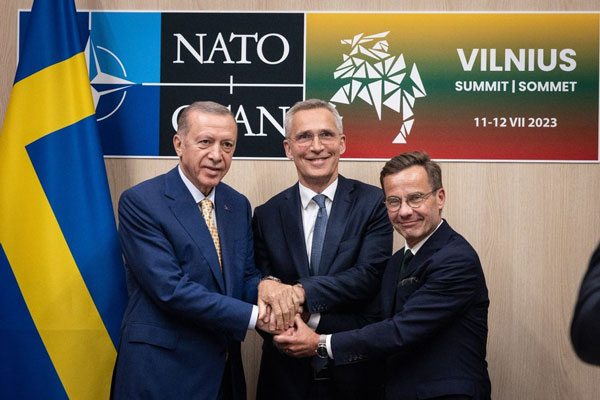Türkiye agreed on Monday July 11, to advance Sweden’s accession to the North Atlantic Treaty Organization (NATO), marking a significant development just before the alliance’s summit in Vilnius, Lithuania. NATO Secretary-General Jens Stoltenberg announced the breakthrough following a three-party meeting with Turkish President Recep Tayyip Erdogan and Swedish Prime Minister Ulf Kristersson. This decision represents a notable step forward for Sweden’s NATO membership aspirations, subject to the approval of all member states.
Türkiye’s Decision Paves the Way for Sweden’s NATO Accession
Türkiye’s agreement to move forward with Sweden’s NATO accession came after previous objections were addressed. Last year, both Sweden and Finland applied for NATO membership, but Türkiye raised concerns regarding the presence of members from the outlawed Kurdistan Workers’ Party (PKK) and the Gulen movement in these countries. While Türkiye withdrew its objection to Finland earlier this year, citing Finland’s actions against these organizations, Sweden’s NATO bid remained blocked until now.
Addressing Security Concerns: Türkiye and Sweden’s Collaborative Efforts
Stoltenberg emphasized that Türkiye and Sweden have been working closely since the 2022 NATO summit to address Türkiye’s legitimate security concerns. Sweden has made significant efforts to meet Türkiye’s requirements, amending its constitution, revising laws, enhancing counter-terrorism cooperation against the PKK, and resuming arms exports to Türkiye. These actions were outlined in the Trilateral Memorandum agreed upon in 2022. To maintain their cooperation, the two countries will continue to operate under the Trilateral Permanent Joint Mechanism and establish a new bilateral Security Compact, which will convene at the ministerial level annually and create working groups when necessary.
Conditions and Support from International Leaders
Earlier on Monday, President Erdogan stated that Türkiye would support Sweden’s NATO membership if the European Union revived membership talks with Ankara. This unexpected condition sparked discussions about potential implications for the alliance’s unity. However, the decision to support Sweden’s accession has gained the support of other leaders and officials worldwide. Hungarian Prime Minister Viktor Orban has signaled his intention to follow Erdogan’s lead, while U.S. President Joe Biden expressed anticipation in welcoming Sweden as NATO’s 32nd ally. German Foreign Minister Annalena Baerbock also lauded the news on Twitter, describing it as “good news.”
Domestic Debates: Organizations in Sweden Express Opposition to NATO Membership
While Sweden’s NATO membership has been a focal point at the Vilnius summit, domestic organizations within Sweden have voiced objections to joining the alliance. The Swedish Peace and Arbitration Society, in particular, emphasized the view that the country would be safer outside of a military alliance. Chairperson Kerstin Bergea expressed concerns about the historical implications and potential escalation of tensions by becoming part of a nuclear weapons alliance. These debates highlight the ongoing discussions and differing perspectives surrounding Sweden’s NATO aspirations.
As Sweden moves closer to NATO membership with Türkiye’s support, the decision not only strengthens the alliance’s unity but also signifies a significant step in Sweden’s evolving defense and security policies. The path to full NATO membership will continue to involve negotiations and deliberations among member states, shaping the future of the alliance and Sweden’s role within it.















